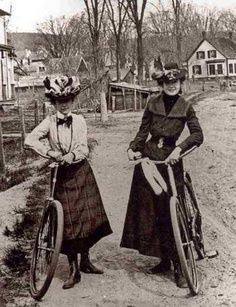What is the greatest threat the hat industry ever faced?
No, it wasn't the Reign of Terror.
Since you are reading this blog, you may have already guessed that it was--the bicycle!
Believe it or not, in 1896, supposedly sane and rational businesspeople actually believed that the bicycle would bring an end to la fabrication des chapeaux. Apparently, cyclists were wearing cheaper caps and saving their more expensive headwear for special occasions--or doing without it altogether. One irate hatter even proposed asking Congress to pass a law that would have required every cyclist to purchase at least two felt hats a year.
But the makers of cranial coverings weren't the only ones who feared for their livelihoods because of the newfangled two-wheelers. Before the bicycle craze of the 1890s, men went for a shave and haircut on Saturday afternoons, in preparation for a night out. "Now they go off on a bicycle and do not care whether they are shaved or not," lamented one barber.
(Imagine how he would react to today's young male denizens of Portland, Oregon and Williamsburg, Brooklyn!)
Shoemakers also complained they were losing business because people weren't walking. Not surprisingly, cigar makers were in a panic: Even in those days, before people knew about the health hazards of smoking, pedal pushers saw that cycling and stogies didn't go together very well. Saloon owners said they were losing business because cyclists preferred other beverages to beer. And, interestingly, booksellers complained that times were tough because people were riding instead of reading.
That last complaint seems really odd to me: Cyclists, at least the ones I know, tend to read more than other people. Perhaps things were different in 1896.
Moreover, I haven't seen that cycling keeps people from drinking beer. Now, I can understand the panic of cigar makers: I can't think of a single cyclist I've ever known who smoked them. Then again, I've never known a lot of people who smoked cigars. For the record, I've smoked two in my entire life, and don't plan on lighting another.
Jason Feifer, the Editor-in-Chief of Entrepreneur, talks about the "panic" I've described to make this point: that change should be embraced rather than fought. We may be experiencing another "golden age" of bicycling and, he explains, it presents all sorts of business opportunities, some in industries that have no apparent relation to cycling. He draws parallels with other innovations that some companies should have embraced, but didn't--or did so when it was too late. For example, he says, music companies should not have resisted streaming, any more than energy companies should have shied away from solar technology.
All you have to do is look at how many books about cycling and bike-themed beers are on the market to understand what he means!
P.S.: A reproduction of the photo in this post hangs on my wall--next to my bicycles, of course!


